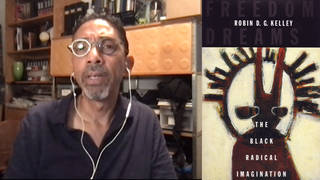
Topics
By Amy Goodman & Denis Moynihan
Grace Lee Boggs died this week at the age of 100. “She left this life as she lived it: surrounded by books, politics, people and ideas,” said her friends and caretakers, Shea Howell and Alice Jennings. Grace Lee Boggs was not only a grass-roots organizer, but a philosopher, a teacher and a revolutionary. She devoted her life to empowering the poor, the working class and communities of color, and was deeply involved with a constellation of movements, from civil rights and black power to labor, environmental justice and feminism. She lived for more than 60 years in Detroit, and witnessed that city transform from the world capital of the automobile industry, through social protest and unrest in the 1960s, to the post-industrial era, where, behind the crumbling facade of empty factories, myriad experiments in urban renewal and local self-reliance are incubating.
“You don’t choose the times you live in, but you do choose who you want to be, and you do choose how you want to think,” she told a group of undergraduates in the film about her life, “American Revolutionary: The Evolution of Grace Lee Boggs.” This remarkable woman lived that credo for a full century.
Grace Lee Boggs was born in 1915, the child of Chinese immigrants, above the family’s restaurant in Providence, Rhode Island. By 16, she was at Barnard College, and by the age of 25 had her Ph.D. in philosophy from Bryn Mawr. I asked her how she became an activist:
“In those days, even department stores would come out and say, ‘We don’t hire Orientals,’” she told me. With her doctorate in hand, she moved to Chicago, where, she said, “I got a job in the philosophy library for $10 a week … it wasn’t enough to get a place to live, other than [a] basement, rent-free. I had to face down a barricade of rats in order to get to the basement. That made me rat-conscious, made me join a tenants’ committee against rat-infested housing, which brought me into contact with the black community for the first time in my life, and enabled me to become part of the March on Washington movement organized by A. Philip Randolph.”
We should thank those Chicago rats for spurring her to action. The “March on Washington” she mentioned was not the well-known march from 1963, where Martin Luther King Jr. gave his famous “I Have a Dream” speech, but rather the 1941 March on Washington. The renowned labor leader A. Philip Randolph, along with the gay, black pacifist Bayard Rustin, both of whom would later lead the famous 1963 march, organized a similar march two decades earlier. In 1940, they saw that domestic war production was lifting hundreds of thousands of white workers out of the prolonged poverty of the Great Depression, but, as most production plants were segregated, was leaving black workers behind. The movement they built forced President Franklin Roosevelt to integrate the plants involved in building the arms for World War II. This helped spur the great migration of African-Americans from the Jim Crow South to the industrial cities of the North.












Media Options